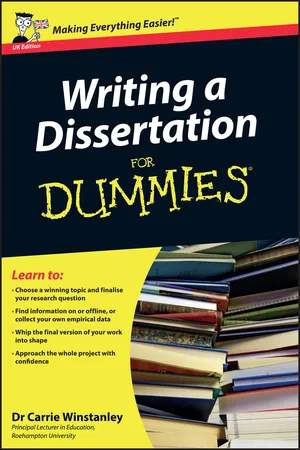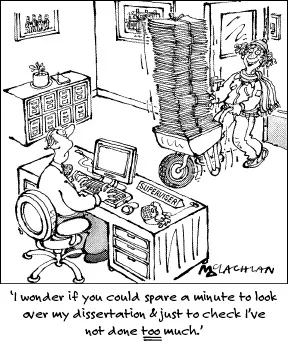
- English
- ePUB (mobile friendly)
- Available on iOS & Android
Writing a Dissertation For Dummies, UK Edition
About this book
Producing a dissertation has become a major requirement of most university courses, both undergraduate and Masters. It's likely to be the largest single piece of work you'll have to submit - and also the hardest!
Writing a Dissertation For Dummies walks you through all the practical and theoretical aspects of writing a dissertation to help you produce a first-class work. This guide is ideal for any student in the broad range of the social sciences, from anthropology to law, psychology to media studies. From choosing a topic, to researching the literature, utilising your supervisor, managing your time, and structuring and writing your dissertation, you'll be able to avoid all the common mistakes and stay on top of your workload throughout the process. You'll also find tips on the best way to reference your work, and expert advice on presentation and binding. This is a must if you want to maximise your marks on your university dissertation.
Writing a Dissertation For Dummies covers:
Part I: What is a Dissertation?
Chapter 1: So You Have to Write a Dissertation
Chapter 2: Thinking About a Research Question
Part II: Getting Set Up for Your Dissertation
Chapter 3: The Structure of Your Dissertation
Chapter 4: Getting Started
Chapter 5: Finalising Your Research Question, Dissertation 'Type' And Considering Ethics
Chapter 6: Reading Efficiently and Taking Useful Notes
Part III: Getting On With Your Research
Chapter 7: Researching in Libraries and the Using the Internet
Chapter 8: Creating Your Own Empirical Data
Chapter 9: Analysing Data And Drawing Conclusions
Chapter 10: Staying on Track
Part IV: Writing and Polishing
Chapter 11: Managing Your Argument: 'Writing Up' Your Non-Empirical Dissertation
Chapter 12: Writing Up Your Empirical Dissertation
Chapter 13: Writing Effectively
Chapter 14: References, Bibliographies and Appendices
Chapter 15: Sorting Out The Presentation of Your Dissertation
Part V: Managing The Overall Experience
Chapter 16: Your Work Habits
Chapter 17: Looking After Yourself Physically and Emotionally
Chapter 18: Ten Common Dissertation Pitfalls to Avoid
Chapter 19: Ten Essential Tips For Completing Your Dissertation
Chapter 20: Ten Items For Your Very Final Checklist
Tools to learn more effectively

Saving Books

Keyword Search

Annotating Text

Listen to it instead
Information




Table of contents
- Cover
- Table of Contents
- Title Page
- Introduction
- Part I: Understanding What a Dissertation Is
- Part II: Getting Set Up for Your Dissertation
- Part III: Getting On with Your Research
- Part IV: Writing and Polishing Your Work
- Part V: Managing the Overall Experience
- Part VI: The Part of Tens
Frequently asked questions
- Essential is ideal for learners and professionals who enjoy exploring a wide range of subjects. Access the Essential Library with 800,000+ trusted titles and best-sellers across business, personal growth, and the humanities. Includes unlimited reading time and Standard Read Aloud voice.
- Complete: Perfect for advanced learners and researchers needing full, unrestricted access. Unlock 1.4M+ books across hundreds of subjects, including academic and specialized titles. The Complete Plan also includes advanced features like Premium Read Aloud and Research Assistant.
Please note we cannot support devices running on iOS 13 and Android 7 or earlier. Learn more about using the app